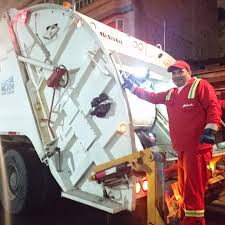
The workers in charge of garbage collection have the purpose of maintaining public spaces: sidewalks, streets and alleys free of the waste generated on a daily basis. They collect garbage, green waste to convert it into fertilizer, and other waste for recycling and new uses. Although today the technology offers a screenshot quite different from the previous years because it has more automated equipment, the dangers such as ergonomic injuries, hazardous waste and car accidents are still present. The job of the garbage collector is one of the most ungrateful, difficult and risky. However, with very simple actions, families can reduce the risks that these workers face on a daily basis. In the United States, according to the Bureau of Labor Statistics of 2013, there are some civil activities that are more risky and dangerous than others related to security and public order. While there are no surprises regarding extractive activities such as forestry, fishing and mining (which occupy the first places of accidents with fatal consequences), as in the case of aircraft pilots, or those working in the construction and energy sector, there are surprises in the case of the garbage collector who occupies the sixth place with 33 accidents with fatal consequences per 100 thousand workers. Although it seems surprising, in the United States, garbage collectors end up being more likely to die at work than police officers themselves. What can happen to them? • First, garbage collectors (especially the informal ones) are exposed to all types of risks: run over, getting stuck with contaminated needles, cutting themselves with glass or becoming infected with some disease. In most cases they do not use appropriate protection mechanisms and citizens do not collaborate or help much with their task segregating hazardous waste. • Second, they do not work directly for the municipalities, but belong to the cleaning companies that win tenders to take charge of all the cleaning services of the districts. There is no direct employment relationship with the municipal administrations. For this reason, they usually lack minimum labor benefits compatible with the risk they assume during work, despite the fact that the collection of waste must be subject to the complementary insurance of risk work established by Supreme Decree 009-1997-SA, which establishes that it includes the elimination of waste and sewage, sanitation and similar activities. The collectors also say that the working conditions are not the best, and that in itself the work is unhealthy. Many do not have the proper clothing that distinguishes them at night by cars, they lack pilots and boots when it rains and, what’s worse, the gloves are not the right ones, so they always end up working without protection on their hands. Needles, syringes and any other sharp puncturing element puts the health of waste collectors at risk. An employee is under preventive treatment when punctured with a needle and syringe that was in household waste. In the event that despite complying with preventive measures there is contact with infected blood and possible infection by a worker, he should know that our legislation does not include AIDS or Hepatitis as an occupational disease. The legal situation, if the worker was actually infected, would correspond to a Work Accident, and would be entitled to all economic and social compensation provided by law for them. In short, being a garbage collector is a very unpleasant, difficult and risky activity. However, their role is key to the wellbeing of the community and for them the municipalities must demand that their suppliers guarantee their workers the adequate working conditions. Families, on the other hand, can significantly reduce the risks that a garbage collector must face if, for example, they segregate the glass from the garbage to avoid unnecessary cuts.







